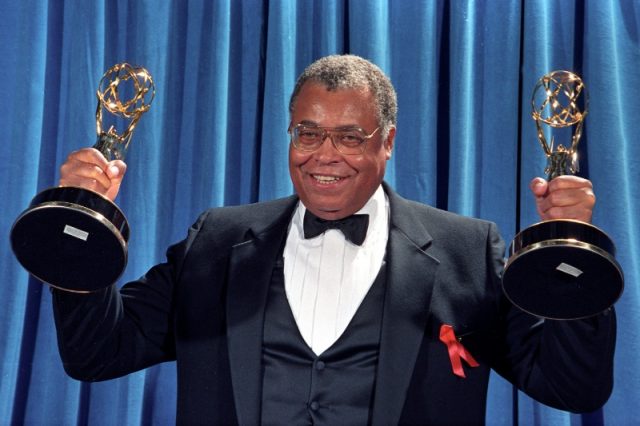
- Originally had not wanted to be credited for Darth Vader voice
- Other movies included ‘Lion King,’ ‘Field of Dreams’
- Also played wide range of Shakespeare leads
LOS ANGELES — American actor James Earl Jones, an imposing stage and screen presence who overcame a childhood stutter to develop a stentorian voice recognized the world over as intergalactic villain Darth Vader, died on Monday at the age of 93.
Jones, a longtime sufferer of diabetes, died at his home surrounded by family members, his agent, Barry McPherson, said.
No cause of death was provided.
Jones had a great physical presence on stage and television, as well as in movies, but he would have been a star even if his face was never seen because his voice had a career of its own. The resonating bass could instantly command respect – as with the sage father Mufasa in “The Lion King,” and many Shakespeare roles – or instill fear as the rasping Vader in the “Star Wars” films.
Jones laughed when a BBC interviewer asked if he resented being so closely tied to Darth Vader, a role that required only his voice for a few lines while another actor did the on-screen work in costume.
“I love being part of that whole myth, of that whole cult,” he said, adding that he was glad to oblige fans who asked for a command recital of his “I am your father” line to Luke Skywalker, played by Mark Hamill.
“#RIP dad,” Hamill wrote on X on Monday with a broken heart emoji above a story about the death of Jones.
Jones said he never made much money off the Darth Vader part – only $9,000 for the first film – and that he considered it merely a special effects job. He did not even ask to be in the credits of the first two “Star Wars” movies.
His long list of awards included Tonys for “The Great White Hope” in 1969 and “Fences” in 1987 on Broadway and Emmys in 1991 for “Gabriel’s Fire” and “Heat Wave” on television. He also won a Grammy for best spoken word album, “Great American Documents” in 1977.
Although he never won a competitive Academy award, he was nominated for best actor for the film version of “The Great White Hope” and was given an honorary Oscar in 2011.
He began his movie career playing Lieutenant Luther Zogg in Stanley Kubrick’s 1964 classic “Dr. Strangelove or: How I Learned to Stop Worrying and Love the Bomb.”
Later acclaimed movie roles included novelist Terence Mann in 1989’s “Field of Dreams” and South African Reverend Stephen Kumalo in 1995’s “Cry, the Beloved Country.” He also starred in “Conan the Barbarian,” “Coming to America,” “The Sandlot,” “Matewan,” “The Hunt for Red October” and “Field of Dreams,” among others.
Jones also was heard in dozens of television commercials and for several years CNN used his authoritative “This is CNN” to introduce its newscasts.
Estranged from father
James Earl Jones was born on January 17, 1931, in the tiny community of Arkabutla, Mississippi, to a family with a mixed ethnic background of Irish, African and Cherokee.
His father, prizefighter-turned-actor Robert Earl Jones, left the family shortly afterward. James was raised by his maternal grandparents, who forbade him to see his father, and the two did not get together until James moved to New York in the 1950s. Eventually they appeared in several plays together.
Jones was about 5 years old when his grandparents moved the family from Mississippi to a farm in Michigan and it was around that time that he quit speaking because of his stutter.
He was mostly silent for a decade until a ploy by his high school English teacher got him to speak up. The teacher made Jones recite to the class a poem that he said he had written to prove he was familiar enough with it to be the author.
Although after that he said he still had to choose his words carefully, Jones learned to control his stutter and became interested in acting.
After studying drama at the University of Michigan, he moved to New York, where his theater performances increasingly attracted critical attention and acclaim.
His breakthrough role on Broadway was “The Great White Hope,” playing a character based on Black heavyweight champion Jack Johnson. The play examined racism through the lens of the boxing world and critics raved about Jones’ performance.
A popular theater draw for decades, his Shakespeare leading roles included Hamlet, Macbeth, King Lear and Othello. He also had a notable portrayal of singer-actor-activist Paul Robeson on Broadway in 1977 and of author Alex Haley in the television mini-series “Roots: The Next Generation.”
He was “capable of moving in seconds from boyish ingenuousness to near-biblical rage and somehow suggesting all the gradations in between,” the Washington Post wrote in a 1987 review of “Fences.”
Jones’ first wife was Julienne Marie Hendricks, one of his “Othello” co-stars. Earl and his second wife, actress Cecilia Hart, who died in 2016, had one child, Flynn Earl Jones.
Jones was a trailblazing Black actor, winning big roles in racially charged movies and plays that broke ground for Black actors that came after him.
But Jones, who first found fame at the height of the Civil Rights movement in the 1960s and 1970s, largely kept himself out of direct action on matters of race.
In a 2013 interview with the Toronto Star, Jones said he imagined that a lot of people felt he was cowardly at the time for not using his fame and voice to more robustly support the cause. But the actor said he preferred to let his work do the talking for him.
“Don’t get me wrong. I believe in the same things that all those people demonstrating believe in, but I just look for plays or movies that say the same thing and play characters in them,” Jones told the Star.
Dominic Hawkins, a spokesperson for the NAACP in Washington, said Jones’ winning of big roles even as the Jim Crow racial caste system still plagued the American South was hugely important for the Black community.
“That was his contribution to civil rights, his representation on screen and stage,” Hawkins said. “Film and TV has the power to shape hearts and minds, and that’s what he did.”
—Reporting by Bill Trott, Lisa Richwine and Brad Brooks; Editing by Richard Chang, Rosalba O’Brien and Michael Perry





